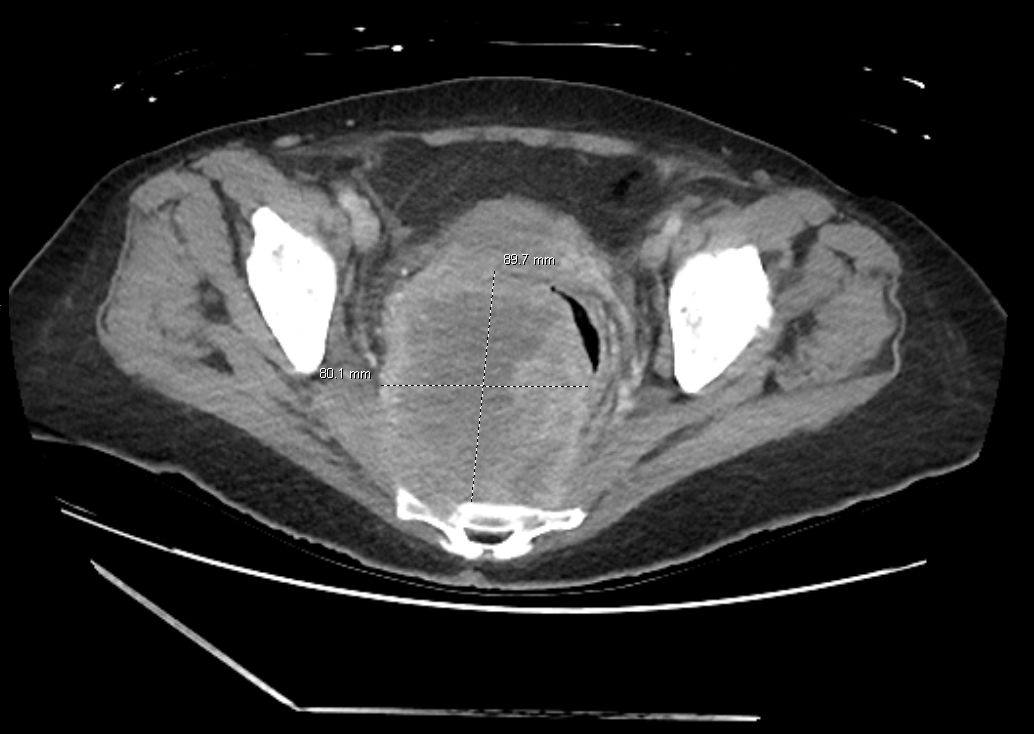Tuesday Poster Session
Category: Colon
P4673 - A Rare Case of Metastatic HPV-Associated Rectal Squamous Cell Carcinoma

Danzhu Zhao, DO
University of Connecticut Health Center
Farmington, CT
Presenting Author(s)
1University of Connecticut Health Center, Farmington, CT; 2University of Connecticut Health, Farmington, CT; 3University of Connecticut, Farmington, CT
Introduction:
Squamous cell carcinoma (SCC) of the anus is strongly associated with high-risk human papillomavirus (HPV) types 16, 18, 31 and 33. However, the link between rectal SCC and HPV, along with its optimal management and prognosis, remains unclear. We present a case of a woman with previously unremarkable colonoscopies and no prior cervical HPV, who was found to have a nine cm HPV-positive rectal SCC mass.
Case Description/
Methods: A 64-year-old woman with GERD and Barrett’s esophagus presented to the ED for severe hypokalemia and leukocytosis. She reported four months of generalized weakness, poor appetite, 20 Ibs unintentional weight loss, abdominal pain, vomiting, loose stools, intermittent constipation without hematochezia, and new-onset urinary retention requiring foley catheter placement. Her colonoscopy in 2019 showed diverticulosis and one benign polyp.
She was afebrile, tachycardic, hypotensive and physical exam was unremarkable. Blood work revealed leukocytosis (27.4 x10^3 /uL), hemoglobin 8.6 g/dL, and hypokalemia (2.9 mmol/L). CT and MRI imaging showed an 8.7 x 7.4 x 9.4 cm mass invading the sacrum and piriformis muscle, extending into the right sacral neural foramina (Figure 1). Flexible sigmoidoscopy revealed a rectal tumor with wall erosion (Figure 2). Pathology confirmed moderately differentiated invasive SCC, HPV (p16) positive (Figure 3). CA-125 was 51. Her Pap smear in 2021 was HPV negative. PET scan showed a 10 cm necrotic large low rectal mass with a left adrenal nodule concerning for metastasis. She underwent a diverting ostomy, radiation, and chemotherapy.
Discussion: Primary rectal SCC is rare (0.1-0.25 per 1000 colorectal cancers), while adenocarcinoma (AC) accounts for approximately 90% of rectal cancers. Risk factors include chronic inflammation, radiation injury, and infections such as HIV. HPV is strongly linked to anal SCC though the role in rectal SCC remains uncertain. Audeau et al. studied 2351 colorectal cancer patients of which 20 had SCC, AC, or mixed tumors located above the dentate line. None tested positive for HPV, suggesting limited association between HPV and rectal SCC. This poses a diagnostic challenge as immunocompetent patients with regular, unremarkable colonoscopies and no prior HPV positivity require a high index of suspicion for HPV related rectal SCC. Weight loss and bowel habit changes should prompt earlier diagnostic evaluation with colonoscopy. Further studies are needed to clarify screening, management, and prognosis of HPV-associated rectal SCC.
Figure: Figure 1. CT image of the 8.7 x 7.4 x 9.4 cm mass in the deep pelvis which seems to arise from the rectal wall. The mass abuts the sacrum, extends into the right S3 neural foramen, and appears to invade the right piriformis muscle.
Figure: Figure 2. An infiltrative non-obstructing mass was found in the rectum on flexible sigmoidoscopy; appearance suspicious for erosion into the rectal wall.
Disclosures:
Danzhu Zhao indicated no relevant financial relationships.
Karol Suchowiecki indicated no relevant financial relationships.
Karthik Mathialagan indicated no relevant financial relationships.
Roopjeet Bath indicated no relevant financial relationships.
Danzhu Zhao, DO1, Karol Suchowiecki, MD2, Karthik Mathialagan, MD3, Roopjeet Bath, MBBS2. P4673 - A Rare Case of Metastatic HPV-Associated Rectal Squamous Cell Carcinoma, ACG 2025 Annual Scientific Meeting Abstracts. Phoenix, AZ: American College of Gastroenterology.
